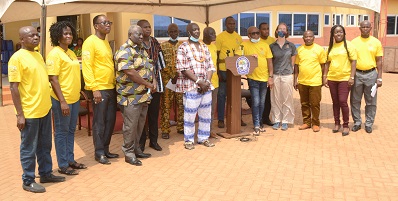
The Kpone-Katamanso Municipal Assembly (KKMA) on Friday launched a mass anti-rabies vaccination of dogs and cats in its jurisdiction to eliminate the prevalence of rabies
It follows a recent report of human rabies death in the municipality.
The campaign, which started February 12 and due to end on February 23, 2022, is on the theme: “Let us collaborate to end Rabies.”
The campaign has a team of 18 officers and eight drivers drawn from the Veterinary Services Directorate of the Ministry of Food and Agriculture and the Ghana Health Service travelling throughout the 45 communities in the area to vaccinate dogs and cats.
Rabies is caused by the rabies virus which is present in the saliva of infected animals. The virus enters the body through broken skin, or eyes, nose or mouth and travels through nerves to the brain.
As the disease progresses the infected person may experience delirium, abnormal behaviour, hallucinations, hydrophobia (fear of water) and insomnia. The acute period of the disease typically ends after two to 10 days.
Once the clinical signs of rabies appear, the disease is nearly always fatal as there is no effective treatment.
The free vaccination exercise was initiated by Mission Rabies, a British NGO, which has donated 20,000 doses of vaccines for the programme.
The Municipal Chief Executive (MCE) of Kpone-Katamanso, Mr Samuel Okoe Amankwa, said the campaign was to deal with the surge of rabies cases in the municipality.
He said the initiative was in line with last year’s World Rabies Day programme aimed at achieving zero rabies by 2030.
Mr Amankwa called for close collaboration between state agencies and the private sector to raise awareness of the diseases and how to eliminate it.
Mission Rabies has a one health approach driven by research to eliminate dog bite transmitted rabies.
The Municipal Health Director of Kpone-Kaamanso, Dr Priscilla Danquah, said rabies affected mostly children under 16 years who were either owners or caregivers.
She said Ghana recorded a total of 15,296 dog bite cases in 2020 and 16,288 in 2021, meanwhile, in 2021 Ghana recorded 140 rabies cases out of which 29 were confirmed to be positive with 12 deaths.
Dr Danquah noted that the Kpone-Katamanso Municipality had been recording increasing trends of dog bite cases since 2016.
“We recorded 289 in 2019; 243 in 2020 and 248 in 2021 with the highest number of cases of 122 recorded in Kpone sub municipal almost half of what the entire municipality recorded in 2021,” she said.
Dr Danquah said since 2017, every other year the municipality recorded a death from rabies with the latest being June last year, adding that there was the need for a sustained education and vaccination of dogs.
She said rabies among dogs had been recorded almost every year since 2020, noting that six rabies cases among dogs had been confirmed with 36 contacts traced which unfortunately led to one death.
She said their challenges included lack of vaccines(prophylaxis) for victims leading to dire consequences and vaccination hesitancy among pet owners.
Africa Project Director of Mission Rabies UK, Dr Jordan’s B. Bailey, said as part of the project, they were educating primary school children on how to prevent rabies.
She advised pet owners to take advantage of the exercise to vaccinate their pets.
Rabies causes 59,000 deaths in 150 countries, 95 per cent of which are in Africa and Asia.
If bitten by a dog one should wash the area immediately with soap under running water for 15 minutes then proceed to the hospital.
FROM GODFRED BLAY GIBBAH, KPONE







